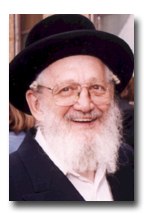By Alan J. Borsuk
of the Journal Sentinel staff
September 7, 1998

Family patriarch, religious scholar, accountant, jokester with a twinkle in his eye — Rabbi Mordecai Dov Ber (Mottel) Twerski was the behind-the-scenes pillar of a family that has been at the forefront of many of the central issues in American Orthodox Judaism.
Twerski, 73, died Sunday morning in New York and, in line with Jewish tradition, was buried later Sunday in Milwaukee, a few feet from the graves of his parents at Beth Hamedrosh Hagodel Cemetery near County Stadium.
He was one of five sons born to Rabbi Jacob and Leah Twerski, who moved to Milwaukee in 1922 from Eastern Europe.
The other four brothers became major figures in contemporary Jewish issues — one is a prominent psychiatrist and author, one a lawyer who was formerly dean of the Hofstra University law school and so on.
A brother, Michel, is the rabbi of Congregation Beth Jehudah, 2700 N. 54th St., and an internationally known rabbinical figure.
But Rabbi Mottel stayed away from the spotlight. He was the one the other brothers counted on for support. With the death in 1981 of his older brother, Shlomo, who was an influential rabbi in Denver, Twerski became the de facto head of the prominent Chasidic family. Family members recall him as their biggest booster and the one who almost never missed a celebration or landmark event in the large and far-flung family.
They also describe him as a highly charitable, easily approachable man who loved to stump both children and adults with brain teasers and riddles, to tell stories and to revel in the “nachas” — a Yiddish term for a special form of joy that comes from the accomplishments of children, grandchildren or anyone else you love.
An ordained rabbi with a classic yeshiva education, he did not hold a pulpit. He got an accounting degree from Marquette University and became a certified public accountant, practicing in Milwaukee before moving to New York in 1960.
His many involvements in the Jewish community in Milwaukee in earlier years included operating a store for a few weeks each year that sold the specially handled and supervised foods and supplies for the spring Passover holiday.
He and members of his family returned to Milwaukee often in recent years.
In August 1997, Twerski, who had been having problems with dizzy spells, fell down a flight of stairs and severely injured vertebrae in his neck. He was left paralyzed and was hospitalized for the 13 months since then, much of the time unconscious or semi-conscious.
Survivors include his wife Sara, seven children, three brothers and numerous grandchildren.
Shortly before the 1997 accident, Twerski told his brother Michel that he did not want any eulogies when he died. He said he always wanted the option of walking out on a speech that wasn’t worth listening to, and he wasn’t going to have that option at his own funeral. At the graveside Sunday night, family members spoke, holding to his request, technically, but making their feelings clear. No celebration would be the same, the loss could not be filled, they said — but their faith would not be shaken.
